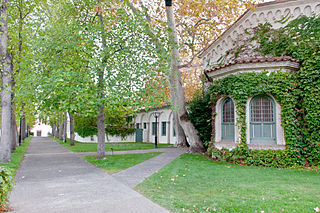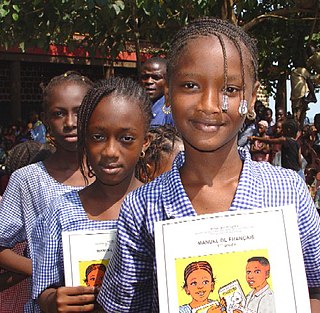Related Research Articles

Barnard College of Columbia University is a private women's liberal arts college in New York City. It was founded in 1889 by Annie Nathan Meyer as a response to Columbia University's refusal to admit women and is named after Columbia's 10th president, Frederick Barnard.
The Seven Sisters is a term that refers to seven highly selective liberal arts colleges in the Northeastern United States that are historically women's colleges. They were created to provide women with the educational equivalent to the Ivy League colleges. The name Seven Sisters is a reference to the Greek myth of The Pleiades, the seven daughters of the Titan Atlas and the sea-nymph Pleione. The daughters were collectively referred to as The Seven Sisters.

A dormitory is a building primarily providing sleeping and residential quarters for large numbers of people such as boarding school, high school, college or university students. In some countries, it can also refer to a room containing several beds accommodating people.

Mixed-sex education, also known as mixed-gender education, co-education, or coeducation, is a system of education where males and females are educated together. Whereas single-sex education was more common up to the 19th century, mixed-sex education has since become standard in many cultures, particularly in Western countries. Single-sex education, however, remains prevalent in many Muslim countries. The relative merits of both systems have been the subject of debate.

Sex segregation is the physical, legal, or cultural separation of people according to their biological sex. Sex segregation can refer simply to the physical and spatial separation by sex without any connotation of illegal discrimination. In other circumstances, sex segregation can be controversial. Depending on the circumstances, it can be a violation of capabilities and human rights and can create economic inefficiencies; on the other hand, some supporters argue that it is central to certain religious laws and social and cultural histories and traditions.
Second-wave feminism was a period of feminist activity, and though it began in the United States in the early 1960s, it lasted roughly two decades. It quickly spread across the Western world with an aim to increase equality for women by gaining more than just enfranchisement.

The Ursulines, also known as the Order of Saint Ursula, is an enclosed religious order of consecrated women that branched off from the Angelines, also known as the Company of Saint Ursula, in 1572. Like the Angelines, they trace their origins to their foundress Saint Angela Merici and place themselves under the patronage of Saint Ursula. While the Ursulines took up a monastic way of life under the Rule of Saint Augustine, the Angelines operate as a secular institute. The largest group within the Ursulines is the Ursulines of the Roman Union.

Single-sex education, also known as single-gender education and gender-isolated education, is the practice of conducting education with male and female students attending separate classes, perhaps in separate buildings or schools. The practice of single-sex schooling was common before the 20th century, particularly in secondary and higher education. Single-sex education in many cultures is advocated on the basis of tradition as well as religion, and is practiced in many parts of the world. Recently, there has been a surge of interest and establishment of single-sex schools due to educational research. Single-sex education is practiced in many Muslim majority countries; while in other parts of the world it is most popular in Chile, Israel, South Korea, and English-speaking countries such as Singapore, Ireland, the United Kingdom, Hong Kong, New Zealand, South Africa and Australia. In the Western world, single sex education is primarily associated with the private sector, with the public (state) sector being overwhelmingly mixed sex; while in the Muslim world the situation is the opposite: public schools are usually single sex, while many private schools are mixed sex. Motivations for single sex education range from religious ideas of sex segregation to beliefs that the sexes learn and behave differently, and, as such, they thrive in a single sex environment. In the 19th century, in Western countries, single sex girls' finishing schools, and women's colleges offered women a chance of education at a time when they were denied access to mainstream educational institutions. The former were especially common in Switzerland, the latter in the US and the UK, which were pioneers in women's education.
Male privilege is the system of advantages or rights that are available to men solely on the basis of their sex. A man's access to these benefits may vary depending on how closely they match their society's ideal masculine norm.

The term unisex public toilets, also called gender-inclusive, gender-neutral and mixed-sex or all-gender toilets, bathrooms or restrooms, or just toilets, refers to public toilets that are not separated by gender or sex. Unisex public toilets can benefit a range of people with or without special needs. They are also valuable for parents who need to help their infant or young child with using the toilet. While the push for gender neutral bathrooms benefits a number of different demographics, it is driven by the transgender community to combat harassment and violence against these populations.
Rape by gender classifies types of rape by the sex and/or gender of both the rapist and the victim. This scope includes both rape and sexual assault more generally. Most research indicates that rape affects women disproportionately, with the majority of people convicted being men; however, since the broadening of the definition of rape in 2012 by the FBI, more attention is being given to male rape, including females raping males.

Women's colleges in the Southern United States refers to undergraduate, bachelor's degree–granting institutions, often liberal arts colleges, whose student populations consist exclusively or almost exclusively of women, located in the Southern United States. Many started first as girls' seminaries or academies. Salem College is the oldest female educational institution in the South and Wesleyan College is the first that was established specifically as a college for women. Some schools, such as Mary Baldwin University and Salem College, offer coeducational courses at the graduate level.

Women's colleges in the United States are single-sex U.S. institutions of higher education that only admit female students. They are often liberal arts colleges. There were approximately 33 active women's colleges in the United States in 2018, down from a peak of 281 such colleges in the 1960s.

Men's colleges in the United States are primarily those categorized as being undergraduate, bachelor's degree-granting single-sex institutions that admit only men. Through much of United States history male only undergraduate higher education was the norm, or a regular feature up to the 1960s. The few remaining well-known men's colleges are traditional independent liberal arts colleges, though at present the majority are institutions of learning for those preparing for religious vocations.

Randolph College is a private liberal arts and sciences college in Lynchburg, Virginia. Founded in 1891 as Randolph-Macon Woman's College, it was renamed on July 1, 2007, when it became coeducational.

Female education is a catch-all term of a complex set of issues and debates surrounding education for girls and women. It is frequently called girl's education or women's education. It includes areas of gender equality and access to education. The education of women and girls is important connection to the alleviation of poverty. Broader related topics include single-sex education and religious education for women, in which education is divided gender lines.
Mississippi University for Women v. Hogan, 458 U.S. 718 (1982), was a landmark decision of the US Supreme Court, decided 5-4, which ruled that the single-sex admissions policy of the Mississippi University for Women violated the Equal Protection Clause of the Fourteenth Amendment to the United States Constitution.
Research into the many possible relationships, intersections and tensions between language and gender is diverse. It crosses disciplinary boundaries, and, as a bare minimum, could be said to encompass work notionally housed within applied linguistics, linguistic anthropology, conversation analysis, cultural studies, feminist media studies, feminist psychology, gender studies, interactional sociolinguistics, linguistics, mediated stylistics, sociolinguistics and media studies.

Sex differences in education are a type of sex discrimination in the education system affecting both men and women during and after their educational experiences. Men are more likely to be literate on a global average, although higher literacy scores for women are prevalent in many countries. Men and women find themselves having gender differences when attaining their educational goals. Although men and women can have the same level of education, it is more difficult for women to have higher management jobs, and future employment and financial worries can intensify. Men tended to receive more education than women in the past, but the gender gap in education has reversed in recent decades in most Western countries and many non-Western countries.
In Thailand, as elsewhere, one can find several different gender roles, identities and diverse visual markers of masculinity and femininity. The demand for positive self-identity is growing in Thailand and support is growing.
References
- ↑ Brody, Celeste; Fuller, Kasi Allen; Gosetti, Penny Poplin; Moscato, Susan Randles; Nagel, Nancy Gail; Pace, Glennellen; Schmuck, Patricia (2005-08-12). Gender Consciousness and Privilege. Routledge. ISBN 9781135699031.
- ↑ "UNESCO Center for Peace » Sister Schools/Universities". www.unescocenterforpeace.org. Retrieved 12 April 2018.
- ↑ O'Connor, Karen (2010-08-18). Gender and Women's Leadership: A Reference Handbook. SAGE. ISBN 9781412960830.
- ↑ Datnow, Amanda; Hubbard, Lea (2013). Gender in Policy and Practice: Perspectives on Single Sex and Coeducational Schooling. London: Routledge. p. 197. ISBN 9781136703775.